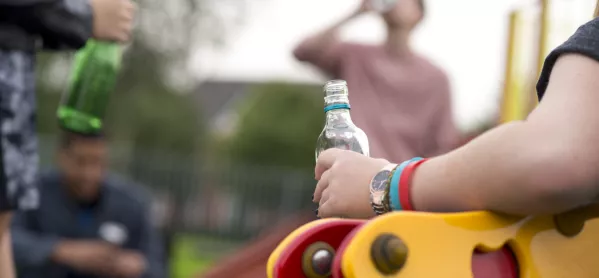A new report is calling for a ban on drinking in public spaces and for beer, wine and spirits to be less visible in shops so that children are less exposed to alcohol.
The report - published today by Scotland’s Children’s Parliament - also suggests that alcohol should not be used to sponsor events where children may be present and calls for more bins to be provided, given that one of the myriad ways in which children say they encounter alcohol is in the form of broken glass and bottles left in play areas and parks.
One child commented: “The Champions League sponsor is Heineken. The logo is green and black. At the start of the match, they announce the sponsor and you can see the adverts all over the stadium.”
Another said: “Sometimes in the park, the bins have been turned upside down and there are empty bottles and rubbish all over the ground.”
Related: Drug abuse among the young ‘isn’t falling’
Short read: Teachers face ‘unjustified’ drug and alcohol tests
Research: Stressed headteachers turn to alcohol
The report has been published following a consultation with 90 primary school pupils between the ages of 9 and 11 and will help to inform the proposals contained in the Scottish government consultation on alcohol marketing due out in the spring.
The impact of alcohol on children
During the sessions, children shared their experiences of alcohol, and talked about what their life might be like if they did not encounter alcohol regularly.
Young people described alcohol as being “everywhere”.
One member of the Children’s Parliament said: “No one asks us about alcohol and suddenly when you think about it, you realise it’s all around you all the time.”
Over the nine workshops, the children identified 236 places where they see alcohol in their lives, with the most common being “shop”, “street”, “park”, “fridge”, “adverts”, “home”, “party” and “bins”.
Feeling “unsafe” was one of the most common issues that children raised when asked how alcohol impacted on their lives. The children said that they could be physically “hurt” by adults under the influence of alcohol either “by accident” or on purpose.
The report says: “Children consider their physical safety to be at risk when surrounded by adults drinking or as a result of alcohol-related debris such as broken glass and bottles ‘left behind’ or, in some cases, ‘thrown’ in public spaces and parks.”
Alison Douglas, chief executive of Alcohol Focus Scotland, which helped with the research, said adults tended to assume that children do not really notice alcohol advertising or people drinking, but this new research shows that this is not the case.
She added: “What this work has shown us for the first time is how often children are seeing alcohol, from opening the fridge at breakfast time, throughout the day in shops and on billboards to in their homes and on TV at night - and the negative effects it can have on their wellbeing.”
Ms Douglas said Scotland has a chance to make a difference in how alcohol is presented.
“The Scottish government’s forthcoming consultation on alcohol marketing provides a real opportunity to show we are listening to children and will take action to protect and promote their right to grow up healthy and happy, free from alcohol harm,” she added.
Public health minister Joe FitzPatrick also supported the work, saying the voice of children should be heard on this issue.
“The Children’s Parliament investigators have done a great job in capturing and sharing the experiences of many of their peers, providing a unique and sobering insight which will help to inform the proposals for our consultation on restrictions to alcohol marketing issuing next spring,” he said.




